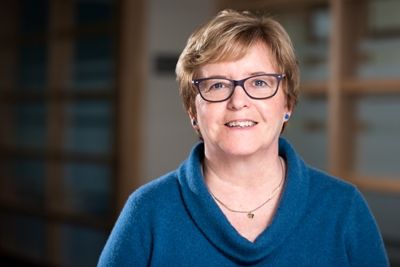
Valerie Hughes, a proud teacher of Queen’s Law students in Kingston and at Herstmonceux Castle, has been called upon once again to apply her legal expertise on the world stage. The retired Director of the Legal Affairs Division at the World Trade Organization (WTO) will soon return to Geneva as a WTO panelist, to assess the international legality of a high-profile trade dispute in the Middle East.
“It's a real honour to be named to this panel,” says Hughes of her second WTO appointment. “I’m working with two other panelists who are both very thoughtful, capable people. One of them is Virachai Plasai, who is currently the Ambassador of Thailand to the United States. The other is Dell Higgie, a very senior diplomat with the New Zealand Ministry of Foreign Affairs & Trade. It's going to be a wonderful opportunity.”
Hughes’ newest panel appointment represents a testament to her international reputation in the field, given the potential implications of this WTO decision on a wide range of international law issues.
“The case covers a vast area of WTO law, including non-discrimination with respect to goods and services, freedom of transit, and protection of intellectual property rights,” she says. “I look forward to delving into those issues. It’s a really interesting case because it has very broad ramifications.”
Hughes is tasked with resolving a trade dispute between the United Arab Emirates (UAE) and Qatar. In 2017, the UAE imposed an economic blockade against Qatar, alleging that it financed terrorism and that the WTO’s national security exception allows the UAE to take these measures. Meanwhile, Qatar contends that the UAE has imposed them unfairly and in violation of WTO law. In recent months, the WTO has been asked to adjudicate other disputes where the security exception has been invoked. For example, in a case brought by Ukraine, Russia has sought to justify its restrictions on traffic in transit from Ukraine through Russia on national security grounds, as has the U.S. in connection with challenges to its steel and aluminum tariffs.
Hughes’ work on the latest case will add even more depth to the wealth of experience she can share with Queen’s Law students. That’s something she has been doing for several years, starting with students in the International Business Law program at the Bader International Study Centre (BISC) in the U.K. Before her retirement in 2016, she was a key official each spring class met to learn all about the WTO. Most recently she has been co-teaching International Economic Law with Professor Nicolas Lamp.
In Hughes’ view, the International Law Programs at the BISC set Queen’s Law apart from other schools, particularly for students interested in working in international law. “The Castle program is probably the real gem and the unique feature of studying international law at Queen's,” she says. “Students can learn about public international law generally, and about international trade, investment, and commercial law. Courses are also offered on the law of armed conflict and international crime, humanitarian law, and the protection of human rights and refugees.”
“If I were going to start my international law studies all over again, I would go to Queen’s,” she adds. “In addition to offering excellent courses, there is a very talented faculty, which includes Professor Nicolas Lamp (Academic Director of the International Law Programs). He is an excellent teacher and the students benefit greatly from his deep scholarship. Moreover, his experience working in the Appellate Body Secretariat of the WTO enables him to bring a very practical approach to teaching international trade. It’s been a real pleasure for me to work with him.”
For students curious about international law, Hughes recommends studying abroad at some point in their academic careers to gain perspective on the different legal systems and customs beyond their borders. “When you study abroad, you get exposed to new points of view and have the opportunity to learn with and from people from all over the world.”
Back home on campus, Queen’s Law students can similarly engage with Hughes, Lamp and other international law experts through the International Trade Law Practicum. This experiential learning opportunity is offered jointly with the University of Ottawa as part of TradeLab, an international law clinic network for students interested in gaining real-world experience in international trade. Students work closely with experts on trade law projects for NGOs, governments and other institutions requiring assistance with international trade problems, be they related to understanding and complying with WTO obligations, drafting chapters of trade agreements, conducting trade litigation or other matters. In the process, students gain practical skills that prepare them for future employment in the field. This year’s Practicum students were invited to present their findings at international conferences in Washington and Ottawa.
Regardless of her 30-plus years of experience – which includes more than 20 years providing counsel to the Government of Canada in the Justice, Foreign Affairs and International Trade, and Finance departments, and co-editing Reflections on Canada’s Past, Present and Future in International Law (McGill-Queen’s) – Hughes remains enthusiastic about what the future holds as she embarks on her next WTO panel decision.
“I'm anxious to get back into the dispute settlement world,” she declares. “It's what I've done for most of my career. I'm pleased to have the chance to keep my hand in the field and continue to learn.”